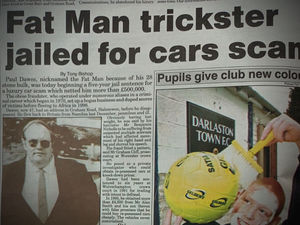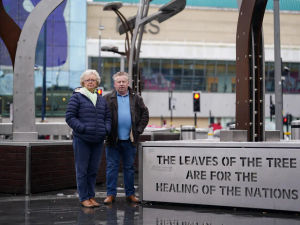The Fat Man Fraudster
He commits mass fraud. He disappears. Detectives have to break the cycle.
Age of Excess
The late 1980s. The age of excess. Red braces, big mobile phones, and fast cars. And for a larger-than-life motor tycoon, with the gift of the gab and a ready supply of cut-price Ferraris, the sky was the limit.
And Paul “The Fat Man” Dawes had it in spades – the swagger, the champagne lifestyle, the flash suits, the private helicopter. He left his business contacts in awe of his conspicuous displays of wealth, on one occasion gambling away £50,000 in a single night. His generous charitable donations saw him fated in high places.
Indeed, there were only two things that he lacked – the supply of cheap Italian supercars, and any wealth that he had genuinely obtained by his own honest endeavour.
The bigger they are, the harder they fall. And 28-stone, 6ft 5in Paul Dawes left nobody in any doubt that he was Mr Big in every sense of the word.
A con-man par excellence, he committed fraud on an industrial scale, swindling some of the biggest players in the motor trade out of hundreds of thousands of pounds. And he did it not once but three times, staging an elaborate disappearing act at the end of each deception.
Det Insp Dave Churchill, a long-standing veteran who specialised in serious fraud, said he had never known another criminal like him – and that was only at half-time in his remarkable criminal career.
Yet for all his trappings of wealth and power, it was a stolen photocopier which brought about his downfall.
Vanishing Act
In 1989, the Black Country businessman appeared to be master of all he surveyed. The boss of Tividale-based Pegasus Communications, he was the go-to man for ambitious yuppies who wanted to save thousands of pounds on their luxury cars.
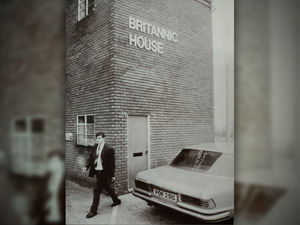
Friends and colleagues told how he walked around with bags of cash stuffed with up to £200,000. And having apparently made a fortune in the motor trade, he decided it was time to go up in the world, entering negotiations to buy a £12 million ocean liner. The plan was to take the 17,500-ton ship to Holland, where it would receive a comprehensive refit, before taking to the seas of the Mediterranean the following December.
Money had also changed hands in a deal to buy a luxury property in Llandrinio on the Welsh-Shropshire border, where he was seen arriving in his helicopter on a number of occasions.
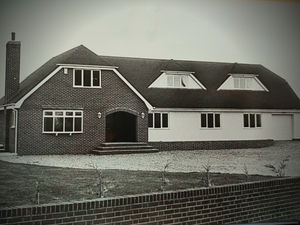
He ran his business from an office in Britannia Street, Tividale. His landlord Stuart Abbott said: “He was a friendly and outgoing bloke, and his business had all the trappings of doing very well.”
By this time, he was starting to enjoy the spotlight, usually as the generous benefactor who rubbed shoulders with the famous, the man who loved to be in the picture handing over the big cheques. In August, 1989, he presented £2,000 to Falklands War hero Simon Weston after putting in an appearance at the Birmingham Super Prix.
Weston, understandably, was delighted by this generosity, and gratefully accepted his invitation to appear as guest of honour at a lavish party Dawes had organised in Walsall the following month.
More than 120 guests turned out for the dinner at The Terrace restaurant in Brownhills, and during the evening Dawes pledged to donate £1,000 a month to his charity, Weston Spirit.
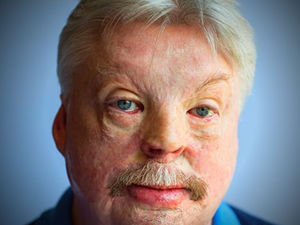
But the following week, The Fat Man had vanished.
On September 4, 1989, police were alerted to a BMW 7-Series which appeared to have been abandoned at the top of a remote cliff in Portreath, Cornwall. Its owner, Paul Dawes, was nowhere to be seen. And when police searched the vehicle for clues, they discovered £26,000 had been left in the boot.
The coastguard immediately launched a full-scale search, and a helicopter was scrambled, but all to no avail. The man who never left anybody in doubt about his presence had apparently vanished from the face of the earth.
He had left home the previous day, saying he was taking £100,000 with him to buy two Mercedes-Benz cars. Det Chief Insp Bernie Hembrough of Devon and Cornwall Police said Dawes rang his family at 9am on September 3 to say he was in Taunton, and that was the last anyone heard from him.
Earlier on the day his car was discovered, a warrant for Dawes’ arrest had been issued at Birmingham Crown Court, after the businessman failed to turn up to a hearing on charges of theft and obtaining property by deception.
The matter Dawes had been in court for was small beer for a man of his apparent means, and related to a leasing agreement for a fax machine and photocopier. With hindsight, he must have surely regretted that he didn’t just plead guilty and take his chances with the judge. But the publicity surrounding his disappearance set alarm bells ringing all around Europe as disgruntled customers came forward with reports of cars that failed to materialise. Within a few days Interpol were drafted in to search for the missing man.
Dawes’ wife Dorothy, 41, was in hospital recovering from a major operation when news of her husband’s disappearance became public. She discharged herself immediately, saying she feared he had been murdered.
Peter Gospel, who was co-director of a telephone sales company with Mrs Dawes, said his business associate was extremely anxious about her husband.
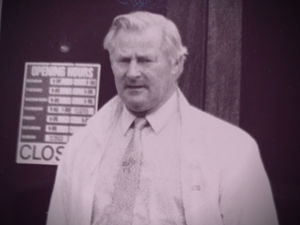
“She did not like a call her husband received from a man setting up a deal to sell limousines,” he said. “She is very worried.”
But she wasn’t the only one concerned about his whereabouts. As details of his disappearance become public, West Midlands Police received 200 calls in four days from people claiming he owed them a total of £2 million, and police said they expected the figure would grow higher.
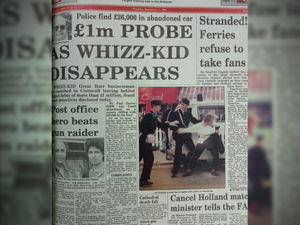
The Resurrection
Eleven days after his disappearance, Dawes turned up at a house in the small rural town of Dungarvan in County Waterford, Ireland. He presented himself to the householder with his hands bound together, and more rope around his ankles. He said he had been kidnapped by a gang of Irish and Americans who had stolen £3.2 million from him. He claimed to have been held hostage in a cellar for 10 days, eating just one square meal over that time.
Police smelled a rat from the beginning. A brief examination by a police doctor found it obvious he had been well fed, something that was confirmed by a urine analysis.
Looking tired and dishevelled, he was flown back under police escort with detectives, and formally arrested in the UK as soon as he reached Birmingham Airport.
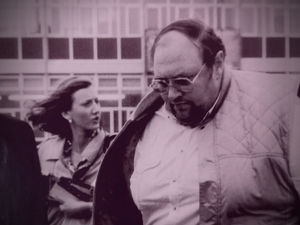
It was said that police in Ireland were not too sad to see the back of him, having found that his greed extended to food as well as money.
“He ate them out of house and home,” said a police source at the time.
By the time he went on trial, in April, 1991, it emerged Dawes had taken substantial deposits from more than 600 people for luxury and high-performance cars that never existed. He was charged with fraud totalling more than £1 million.
His debtors were a mixture of fellow motor traders – he did business with automotive giants Kennings, Autobank and Avis – and wealthy individuals who had handed over large deposits after being promised by the lure of huge discounts on Ferraris, Rolls-Royces, Bentleys and Porsches. One of his wilder claims was that he could deliver 11 Ferrari Testarossas for £78,000 each, half the list price, at a time when the largest dealer in the country only received six a year.
To back up his story, there were indeed some happy punters. He claimed he could get big discounts by buying in bulk, and there was a grain of truth in that, but he was never going to be able to supply them at the prices he was offering.
In reality it was one, very elaborate pyramid scam. He had no shortage of customers happy to give him deposits of £20,000 up front, and some of this money was used to buy cars. Those lucky enough to take delivery of their cars did indeed get a genuine bargain, because he bought them at close to list price, and sold them at a considerable loss. But as long as the deposits rolled in, he could keep the scam going.
And the happy customers, coupled with the jet-set lifestyle, meant he had serious credibility. His order book continued to grow.
Typically, he would cream off 50 per cent of the money himself, which he would stash in secret bank accounts abroad, and the other half would be used to buy enough cars to keep face until the money ran out.
And then he disappeared.
On April 8, 1991, 37-year-old Dawes pleaded guilty to fraudulent trading and the theft of more than £1 million.
Jailing him for six years, Judge John Evans said Dawes ‘preyed on the gullibility and readiness of people to snatch a bargain’.
He also disqualified Dawes from acting as a company director for the maximum 15 years, and told him: “I have little doubt that somewhere there is likely to be a very large amount of cash which at some time you will seek to use for your own purposes.”
His own barrister, Mr David Crigman QC, admitted: “He has lived the life of Riley, and has done so mostly on the proceeds of other people’s money.”
The court heard that Dawes, who had previously lived in Fradley, near Lichfield, had a long criminal record stretching back to 1970, and he had previously served time in prison.
The playboy lifestyle was also revealed to be a bit of a sham, too. He lived in a semi-detached house in Norbreck Close, Great Barr, a comfortable middle-class cul-de-sac, but far removed form the international tycoon he purported to be. The helicopters he used to arrive for business meetings were invariably hired.
Det Insp Dave Churchill said: “I have never come across a character with an approach like his before.
“And I have never come across anything like the kidnap story. It was certainly different form the normal run-of-the-mill alibi.”
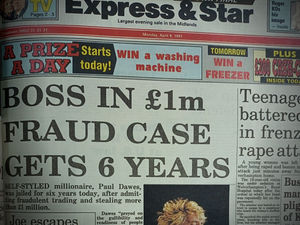
Straight Back At It
What Mr Churchill did not realise was that was just the beginning. Dawes served just three years of his sentence, and almost as soon as he was released on licence, he was back in the scamming business.
Initially he posed as a private investigator who could obtain repossessed cars at knock-down prices. In 1995, he obtained more than £4,500 from Alan Smith and his son Steven, promising them cut-price cars which never materialised. Later that year, he persuaded Stourbridge businessman Jim O’Neil to start a company trading in repossessed cars. Mr O’Neil, of Norton Road, transferred £40,000 of his own money into O’Neil Autos, and Dawes did supply some legitimate vehicles. But just as it was with his previous scam, this was merely the bait to get Mr O’Neil hooked. In 1997 Dawes told Mr O’Neil he could obtain desirable luxury cars direct from a leasing company. Impressed by the work Dawes had done previously, Mr O’Neil began taking orders for these cars, with wealthy clients prepared to hand over large sums of money up front. More than £650,000 went through O’Neil Autos, before Dawes fled with most of the cash – leaving Mr O’Neil to face the angry customers.
Not only did Mr O’Neil himself become the subject of suspicion, but the losses sustained also wrecked his hope of an early retirement. He repaid £287,000 of his own money to 12 people who had threatened court action against him.
“I accept that we were motivated by greed but we genuinely thought these cars could be delivered,” said Mr O’Neil. “The con was very cleverly worked.”
It turned out Mr O’Neil was one of a dozen company executives who had been conned in this way – but there was still more to come.
As police once more began the search for the missing conman, an Express & Star reporter started receiving calls from a disgraced former prison governor, who was now serving time himself. He claimed to have information relating to Dawes’ whereabouts, and the journalist visited him in prison to find out more.
It turned out that after a brief period hiding from his debtors in Blackpool, Dawes fled to the Rotterdam. And it was from the Dutch port that Dawes, now calling himself Steve Williams, was masterminding another scam.
In the late 1990s, there was growing disquiet about the high price of cars in the UK compared to continental Europe. Manufacturers and dealers justified this by saying UK cars had higher specifications, and had to be supplied in right-hand-drive form. In reality, they were simply exploiting the huge company-car market which was unique to the UK, something that became evident as car dealers in mainland Europe started selling UK-spec, right-hand-drive cars at considerably less than their British counterparts. This led to a burgeoning industry of unofficial car importers who would supply vehicles sourced from European dealers to the British customers. And this would be the focus of Dawes’ next sting.
Dawes, or Williams as he was now known, began advertising a company called Excars, which claimed to be able to supply UK-spec cars at well below British dealer prices. And of course, the cars never materialise.
Felix Frixou, 61, who runs Bavarian Benz Motors in Belper, Derbyshire, has been in the motor trade for four decades. But when he saw an advert for Excars in a motoring magazine, he thought it was an opportunity that was too good to miss. He did his checks, and Rotterdam Chamber of Commerce gave his company a glowing reference. And Dawes seemed to know his stuff, he spoke like a seasoned veteran of the motor traded.
Mr Frixou handed Dawes £18,500 as a deposit on four cars, including a Mercedes E Class and a VW Golf. The cars never arrived.
By May 1999, was a wanted man. While police in the UK wanted to speak to him in connection with fraud totalling £800,000, detectives in the Netherlands were chasing him for the theft of £10 million. With the heat well and truly on, it was time for another disappearing act. It is believed he briefly returned home – he had an address in Graham Road, Halesowen – before leaving again for Africa.
Det Insp Dave Churchill, who was once again heading the police investigation, said intelligence showed he stayed in Zimbabwe for some time, before later settling in Namibia.
Questions were being asked about how Dawes was able to move about so freely without detection, when another bombshell emerged –it was claimed he was being helped by police.
In June, 1999, Mr Churchill confirmed he had received information that Dawes was being protected by officers, for whom he had been acting as an informant. Mr Churchill said he was investigating allegations that Dawes had been allowed to disappear after helping police arrest a drug dealer in August 1996.
Eventually, Dawes was found in Zimbabwe, running a nightclub and another car sales business mired in claims of fraudulent activity. Extradition proceedings were lodged, but he fled to Mozambique, and later Namibia.
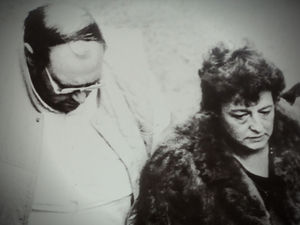
Caught
Then, towards the end of 2000, when it looked as Dawes had evaded justice again, the police received some remarkable intelligence – Dawes was planning a return to the UK.
On Christmas Day 2000, Dawes flew into Gatwick Airport, where he was arrested by officers who had been waiting for him.
And on his return, it was evident that The Fat Man had become The Frail Man. The swaggering giant, with his love for the finer things in life, was now a shadow of his former self. Gaunt and thin, Dawes 6ft 5in frame was barely recognisable as he walked with a pronounced stoop. He looked considerably older than his 47 years.
When he appeared before Dudley magistrates in January 2001, he pleaded to seven charges of deception, and he was jailed for five years at Worcester Crown Court the following March.
His barrister, Mr Benjamin Nicholls, said Dawes had been left little option but to return home as his health deteriorated, and his money ran out. A companion had left him to ‘take a slow boat to Brazil’, leaving him friendless and penniless as he battled with mutiple sclerosis, the court was told.
“He is not in a position, in terms of physical health to swindle anyone again,” said Mr Nicholls. “He cannot talk clearly, and his criminal career is well and truly at an end.”
As Dawes went to begin his sentence, Det Insp Dave Churchill said: “Paul Dawes is the ultimate fraudster.
“Many people believe they would never be caught out by a conman – but that is what makes them so good at what they do. He has caused a lot of heartache and misery for a great number of people.”
The bigger they come, the harder they fall. And the self-styled Mr Big of the motor trade had finally coming crashing to the ground.
